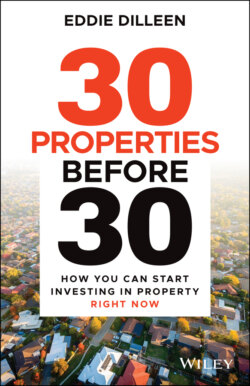Читать книгу 30 Properties Before 30 - Eddie Dilleen - Страница 18
Playing catch-up
ОглавлениеThe weeks following the exchange of contracts for my first property were both exciting and terrifying. I worried about being able to pull it all off and whether I would be able to scrape enough money together to cover all the extra fees that were popping up during the purchasing process. Not only had I just made the biggest financial decision of my life, but it was bang in the middle of the festive season. I had planned a holiday with some friends from school and I knew money was going to be tight. If I kept a cool head and remained disciplined, I could play catch-up once the property had settled.
So what does playing catch-up involve? The rule of thumb when buying properties is to have a financial buffer in place in case something goes wrong. This is standard practice and a very important strategy. It ensures you won't be caught out by unexpected fees and expenses that crop up.
Playing catch-up is a strategy I have used when purchasing a property when I don't have that buffer. This was the case with my first property. The way I see it is, if you're short of a small amount (say, $1500 for legal fees), and the property looks set to make you money upon purchase, then you do whatever it takes to pull that money together and make it happen.
It can be risky, but hear me out. The crucial piece of this strategy is that the property must be purchased below market value, meaning you should stand to make an immediate profit on the purchase.
So, what are some reasons a house may be being sold for lower than market value? It could be a bank repossession or the vendor may have a personal problem, such as a death in the family. There are any number of reasons. Finding such properties takes a little more time and research, but they are out there.
How can you come up with the money? The answer to this question is limited only by your imagination. You could perhaps sell something you own, borrow from a family member, put your phone bill on a payment plan to free up some cash or take out a personal loan or a cash advance on your credit card. Although borrowing money to borrow more money might sound scary, you can pay it back once you are receiving rent by living frugally for a couple of months after the sale — that is, playing catch-up.
A principle I live by that has been crucial to my journey is that sometimes you need to go through some short-term pain on the road to long-term gain. A property that is producing rental income will eventually go up in value and give you more leverage with the bank for future purchases. This is surely worth a few missed nights out, new clothes and takeaway meals.
This sort of thing isn't for everyone, and I do highly recommend having that buffer set aside if you can. If you don't have that buffer however, and if you are just starting out and are willing to put in the work, and you want it badly enough, you can usually still make it happen.
One of my favourite sayings is fortune favours the bold. You can do all the research, and have all the figures and the right plans in place, but taking that leap of faith will require your total confidence in yourself and your ability to pull it off. With property #1, my hard work paid off and I managed to pull together the funds in time.
Buying my first property was a huge accomplishment and the realisation of a long-held dream. All the years spent saving and researching had finally paid off, and for a moment there I thought I was done. I set about doing what most young guys do — having fun, partying and travelling. I do believe that life is there to be lived, and I enjoyed myself at the time, but looking back I believe that waiting a year and a half before buying my next property was one of the biggest mistakes I've made.
To be fair, I was still young and was proud of my achievement, but my journey had only just begun.
